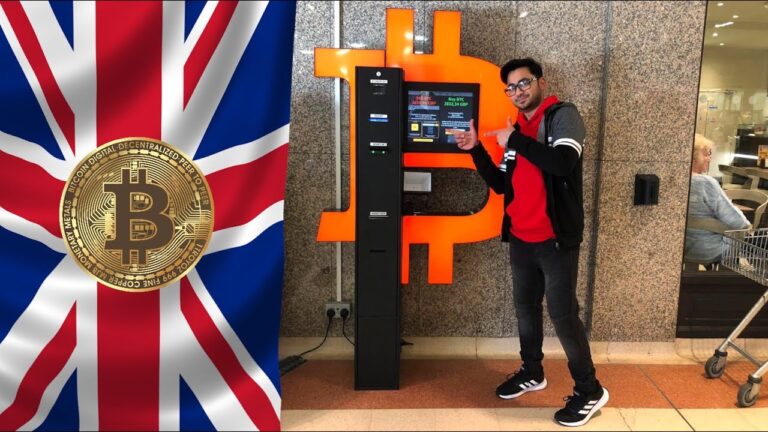In the era where a digital revolution is continuously reshaping our financial landscape, Bitcoin has emerged as a frontrunner among cryptocurrencies. Its decentralized nature and potential for high returns have captured the attention of investors and the general public alike. Bitcoin ATMs appeared as a bridge between the digital currency and physical cash, but their journey in the United Kingdom has hit significant regulatory roadblocks. This article delves into the situation surrounding Bitcoin ATMs in the UK, exploring the implications of recent regulatory decisions.
Background Information
What are Bitcoin ATMs?
Bitcoin ATMs are kiosks that allow individuals to purchase Bitcoin and other cryptocurrencies using cash or debit card. Some machines also offer the reverse service: selling Bitcoin in exchange for cash. Unlike traditional ATMs, which connect to a bank account, Bitcoin ATMs link directly to a Bitcoin wallet or exchange.
A Brief History
The first Bitcoin ATM was installed in Vancouver, Canada, in 2013. Since then, the concept has spread globally, with thousands of machines installed worldwide. The UK saw the installation of its first Bitcoin ATM in 2014, and for a while, the number steadily increased.
Current Situation in the UK
As of early 2023, the UK’s Financial Conduct Authority (FCA) has begun cracking down on Bitcoin ATMs. The regulatory body deemed all crypto ATMs in the country illegal, citing a lack of compliance with registration and anti-money laundering standards. This move has led to the shutdown of existing machines and has put a halt on the installation of new ones.
Legal and Regulatory Framework
The FCA’s decision to ban Bitcoin ATMs stems from broader concerns surrounding the cryptocurrency market. The regulatory framework in the UK mandates that all firms conducting crypto-related activities must be registered and comply with UK Money Laundering Regulations. The ban reflects the FCA’s stance that Bitcoin ATM operators have not met these requirements.
Compliance Hurdles
For Bitcoin ATM operators, obtaining FCA approval is a complex process involving stringent anti-money laundering checks and proving that they have the proper oversight and security measures in place. The FCA’s strict approach aims to prevent illicit activities such as money laundering and terrorist financing, which have been associated with the anonymity of cryptocurrency transactions.
Economic Impact
Before the ban, Bitcoin ATMs were seen as a convenient access point for cryptocurrency enthusiasts and a potential driver for the adoption of Bitcoin as a legitimate currency. The ATMs also provided fees to operators and increased foot traffic for the businesses that housed them. The ban has undoubtedly put a dent in the crypto economy in the UK, affecting both operators and consumers.
Challenges and Controversies
Security Concerns
Security is a primary concern for regulators. Bitcoin ATMs have been criticized for their potential to be used for illegal transactions due to the anonymity they can provide. The UK’s ban reflects these concerns and a desire to maintain control over financial transactions.
Fraud and Scams
There have also been reports of scams associated with Bitcoin ATMs. Unsuspecting users have been tricked into sending money to scammers through these machines. The difficulty in tracing and recovering funds once they are converted into cryptocurrencies makes Bitcoin ATMs attractive to fraudsters.
Case Studies
While specific examples of Bitcoin ATM operators in the UK are now a thing of the past, looking at the wider global market shows a mixture of successes and failures. Operators who have managed to navigate the regulatory landscape successfully continue to thrive, whereas those who have not faced shutdowns and legal actions.
Future Prospects
Despite the current ban, the future of Bitcoin ATMs in the UK is not entirely bleak. As the regulatory environment evolves and operators become more adept at compliance, there could be a path for the re-introduction of Bitcoin ATMs. Additionally, technological advancements and increased public knowledge could pave the way for a more secure and transparent Bitcoin ATM network.
Conclusion
The UK’s ban on Bitcoin ATMs has stirred debate and brought to light the delicate balance between innovation and regulation. While the current state of Bitcoin ATMs in the UK is in limbo, the evolving nature of both technology and regulation could see a resurgence of these machines under the right conditions. For now, the crypto community and potential operators must navigate a landscape that is cautious and compliance-focused, reflecting the broader scrutiny that the crypto industry faces worldwide.
Those interested in the evolving story of Bitcoin ATMs in the UK should follow updates from the Financial Conduct Authority and other regulatory bodies. Reports from the crypto industry and financial news outlets will also provide ongoing coverage of how the situation unfolds.

0 Comments